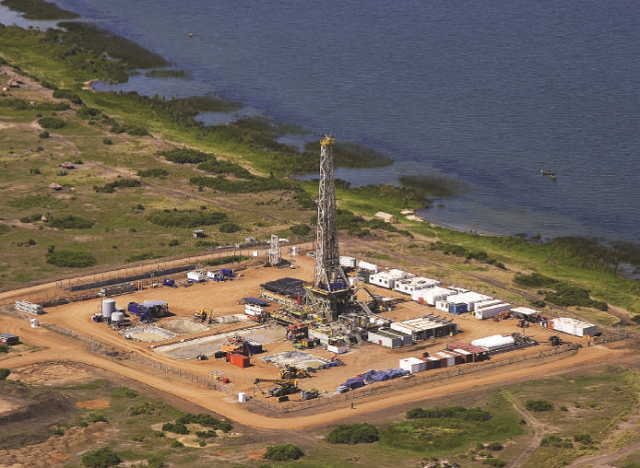Oil refiners across the world are facing tough decisions – whether to reduce capacity, repurpose or reinvent themselves to survive and thrive through the energy transition.
Uganda is however determined to have a refinery by 2026. With the push for energy transition, can Uganda’s refinery survive and remain profitable?
As of the end of June 2021, the refinery Front End Engineering Design (FEED) was at about 97%. It is expected that the FEED will complete before end of August 2021.
Uganda National Oil Company expects that the project’s Final Investment Decision will be ready by mid-2022.
While some studies and analysts say the future of the refinery sector is likely to be challenging especially in the second half of the century, Uganda National Oil Company (UNOC) which will own 40% of the refinery has indicated that the project will remain profitable.
It is expected that EAC partner States of Kenya and Tanzania will take up 2.5% and 8% of the shares respectively while CNOOC has also expressed interest in taking up about 2% Uganda’s shareholding in the refinery project.
Peter Muliisa, the Chief Legal and Corporate Affairs Officer at Uganda National Oil Company, said while there is excitement about the likely economic benefits from the country’s oil finds, the energy transition debate cannot be ignored.
“It is challenging that while we are excited about the production, the possibility of supporting government revenue, we have this conversation about energy transition peak demand and what would be the impact on our prices. It is a challenge and we have to think about it “he said
Muliisa says the refinery project is likely to be sanctioned in the second half of next year. “We are focusing more on in-country use of the resources that we produce downstream”
Albertine Graben Refinery Consortium (AGRC)—comprised of YAATRA Africa LLC, Mauritius; Lionworks Group Ltd.; Mauritius; Baker Hughes General Electric’s (BHGE) Italian subsidiary Nuovo Pignone International SRL; and Saipem SPA of Italy was selected in 2018 to finance, develop, construct, and operate the Greenfield Oil Refinery in Buseruka Hoima.
The refinery will form part of the Kabaale Industrial Park. Currently estimated to cost USD 3-4 billion, the refinery is expected to have an initial capacity of 30[PB1] ,000 barrels per day (bpd), which may increase to 60,000 bpd. This initial capacity represents around 12[PB2] percent of expected oil production, with the remainder being exported through a pipeline via Tanzania.
The General Manager – Uganda Refinery Holding Company Ltd (URHC), Dr. Michael Mugerwa presenting at the recently concluded7th annual oil and gas convention hosted by Chamber of Mines Convention said the refinery is pegged on a 30-year production profile from early 2026 when Uganda is expected to begin producing oil and gas.
According to the March 2021 IHS Markit energy and natural resources research analysis, oil refiners across the world are facing tough decisions -whether to reduce capacity , repurpose the refineries or reinvent themselves.
It said in a context of difficult market conditions for traditional oil derived fuel markets, refiners are increasingly focusing on energy transition with the double goal of improving the profitability of their assets and securing long term operations, looking for opportunities in new sectors and environmental imperatives.
According to Mugerwa, the planned refinery is designed to process Uganda’s crude oil, into petroleum products including liquefied petroleum gas (LPG), premium and regular gasoline, jet fuel, diesel, and low-Sulphur fuel oil.
“It essentially enables us to upgrade the heavy portions of the crude and produce a number of products like Gas or technically known as LPG, gasoline or petrol, fuel for aircraft, diesel and heavy fuel oil” said Mugerwa
In addition, Mugerwa says other products like plastics, some petrochemicals as well as nitrogen-based fertilizers will in the short-term create 32000 jobs opportunities and 700 in the long term.
“The direct benefit in terms of balance of payments annually is about $590 basing on the fact that we are currently importing 100% of our petroleum products. But we get in export mode and we cut out on those imports, we see a net positive to our balance of payment” said Mugerwa
He revealed that there is likely to be a positive fiscal impact with over $800 million to the treasury.
“Overall we are seeing very good benefits. Once you start incorporating the Kabaale industrial park, then you will probably double those benefits as we see them. Those macroeconomic benefits” said Mugerwa
The National Oil Company and the Uganda Refinery Holding Company Ltd have to projected that Internal Rate of Return (IRR) on the project will exceed the 15% conservative model.
Typically, the annualized rate of earnings on infrastructure investment expressed in percentages ranging between 12%-15%.
So for many, if the projections are right, Uganda’s refinery investment may not turn into a “stranded asset” or loss-making part of the oil and gas infrastructure.
The optimism for the profitability of the refinery project is based on increased demand of petroleum products which is projected to increase by about 14percent and 7 percent over the next 10 years for diesel and petrol respectively. In addition, it is anticipated that Uganda will sell some of the products to the neighboring South Sudan and Eastern Democratic republic of Congo.
In 2015 International Monetary Fund modelling suggested that Uganda’s refinery size as then envisaged was viable and quite profitable under certain conditions.
IMF however said while government said there are likely be savings on oil imports and improved energy security, those these benefits are not guaranteed, give with loss-making refineries elsewhere on the continent and the world shifting away from oil.
Energy Ministry’s Petroleum Exploration, Development and Production Commissioner, Honey Malinga said while the global energy transition towards a lower carbon economy poses areal challenges to Uganda and new oil producers, fossil fuels like LNG, diesel, gasoline and others will still remain relevant in Africa.
The international community pushing for a rapid decrease in carbon emissions due to climate change has seen a decline in foreign investment directed towards the African energy sector.





